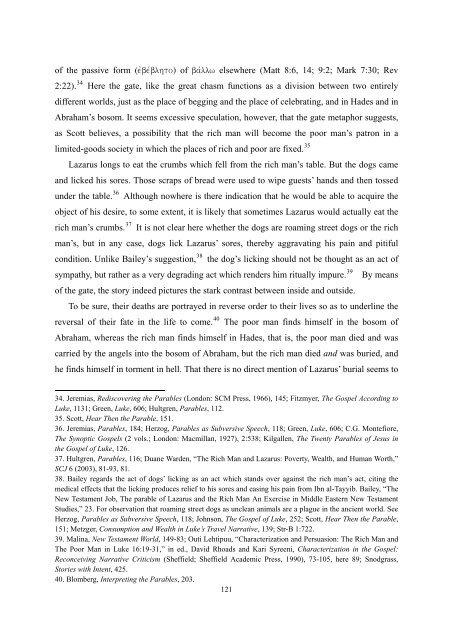the role of the lukan parables in terms of the purpose of luke's gospel
the role of the lukan parables in terms of the purpose of luke's gospel
the role of the lukan parables in terms of the purpose of luke's gospel
You also want an ePaper? Increase the reach of your titles
YUMPU automatically turns print PDFs into web optimized ePapers that Google loves.
<strong>of</strong> <strong>the</strong> passive form ( <strong>of</strong> elsewhere (Matt 8:6, 14; 9:2; Mark 7:30; Rev<br />
2:22). 34 Here <strong>the</strong> gate, like <strong>the</strong> great chasm functions as a division between two entirely<br />
different worlds, just as <strong>the</strong> place <strong>of</strong> begg<strong>in</strong>g and <strong>the</strong> place <strong>of</strong> celebrat<strong>in</strong>g, and <strong>in</strong> Hades and <strong>in</strong><br />
Abraham’s bosom. It seems excessive speculation, however, that <strong>the</strong> gate metaphor suggests,<br />
as Scott believes, a possibility that <strong>the</strong> rich man will become <strong>the</strong> poor man’s patron <strong>in</strong> a<br />
limited-goods society <strong>in</strong> which <strong>the</strong> places <strong>of</strong> rich and poor are fixed. 35<br />
Lazarus longs to eat <strong>the</strong> crumbs which fell from <strong>the</strong> rich man’s table. But <strong>the</strong> dogs came<br />
and licked his sores. Those scraps <strong>of</strong> bread were used to wipe guests’ hands and <strong>the</strong>n tossed<br />
36<br />
under <strong>the</strong> table. Although nowhere is <strong>the</strong>re <strong>in</strong>dication that he would be able to acquire <strong>the</strong><br />
object <strong>of</strong> his desire, to some extent, it is likely that sometimes Lazarus would actually eat <strong>the</strong><br />
rich man’s crumbs. 37 It is not clear here whe<strong>the</strong>r <strong>the</strong> dogs are roam<strong>in</strong>g street dogs or <strong>the</strong> rich<br />
man’s, but <strong>in</strong> any case, dogs lick Lazarus’ sores, <strong>the</strong>reby aggravat<strong>in</strong>g his pa<strong>in</strong> and pitiful<br />
condition. Unlike Bailey’s suggestion, 38 <strong>the</strong> dog’s lick<strong>in</strong>g should not be thought as an act <strong>of</strong><br />
sympathy, but ra<strong>the</strong>r as a very degrad<strong>in</strong>g act which renders him ritually impure. 39<br />
By means<br />
<strong>of</strong> <strong>the</strong> gate, <strong>the</strong> story <strong>in</strong>deed pictures <strong>the</strong> stark contrast between <strong>in</strong>side and outside.<br />
To be sure, <strong>the</strong>ir deaths are portrayed <strong>in</strong> reverse order to <strong>the</strong>ir lives so as to underl<strong>in</strong>e <strong>the</strong><br />
40<br />
reversal <strong>of</strong> <strong>the</strong>ir fate <strong>in</strong> <strong>the</strong> life to come. The poor man f<strong>in</strong>ds himself <strong>in</strong> <strong>the</strong> bosom <strong>of</strong><br />
Abraham, whereas <strong>the</strong> rich man f<strong>in</strong>ds himself <strong>in</strong> Hades, that is, <strong>the</strong> poor man died and was<br />
carried by <strong>the</strong> angels <strong>in</strong>to <strong>the</strong> bosom <strong>of</strong> Abraham, but <strong>the</strong> rich man died and was buried, and<br />
he f<strong>in</strong>ds himself <strong>in</strong> torment <strong>in</strong> hell. That <strong>the</strong>re is no direct mention <strong>of</strong> Lazarus’ burial seems to<br />
34. Jeremias, Rediscover<strong>in</strong>g <strong>the</strong> Parables (London: SCM Press, 1966), 145; Fitzmyer, The Gospel Accord<strong>in</strong>g to<br />
Luke, 1131; Green, Luke, 606; Hultgren, Parables, 112.<br />
35. Scott, Hear Then <strong>the</strong> Parable, 151.<br />
36. Jeremias, Parables, 184; Herzog, Parables as Subversive Speech, 118; Green, Luke, 606; C.G. Montefiore,<br />
The Synoptic Gospels (2 vols.; London: Macmillan, 1927), 2:538; Kilgallen, The Twenty Parables <strong>of</strong> Jesus <strong>in</strong><br />
<strong>the</strong> Gospel <strong>of</strong> Luke, 126.<br />
37. Hultgren, Parables, 116; Duane Warden, “The Rich Man and Lazarus: Poverty, Wealth, and Human Worth,”<br />
SCJ 6 (2003), 81-93, 81.<br />
38. Bailey regards <strong>the</strong> act <strong>of</strong> dogs’ lick<strong>in</strong>g as an act which stands over aga<strong>in</strong>st <strong>the</strong> rich man’s act, cit<strong>in</strong>g <strong>the</strong><br />
medical effects that <strong>the</strong> lick<strong>in</strong>g produces relief to his sores and eas<strong>in</strong>g his pa<strong>in</strong> from Ibn al-Tayyib. Bailey, “The<br />
New Testament Job, The parable <strong>of</strong> Lazarus and <strong>the</strong> Rich Man An Exercise <strong>in</strong> Middle Eastern New Testament<br />
Studies,” 23. For observation that roam<strong>in</strong>g street dogs as unclean animals are a plague <strong>in</strong> <strong>the</strong> ancient world. See<br />
Herzog, Parables as Subversive Speech, 118; Johnson, The Gospel <strong>of</strong> Luke, 252; Scott, Hear Then <strong>the</strong> Parable,<br />
151; Metzger, Consumption and Wealth <strong>in</strong> Luke’s Travel Narrative, 139; Str-B 1:722.<br />
39. Mal<strong>in</strong>a, New Testament World, 149-83; Outi Lehtipuu, “Characterization and Persuasion: The Rich Man and<br />
The Poor Man <strong>in</strong> Luke 16:19-31,” <strong>in</strong> ed., David Rhoads and Kari Syreeni, Characterization <strong>in</strong> <strong>the</strong> Gospel:<br />
Reconceiv<strong>in</strong>g Narrative Criticism (Sheffield; Sheffield Academic Press, 1990), 73-105, here 89; Snodgrass,<br />
Stories with Intent, 425.<br />
40. Blomberg, Interpret<strong>in</strong>g <strong>the</strong> Parables, 203.<br />
121
















